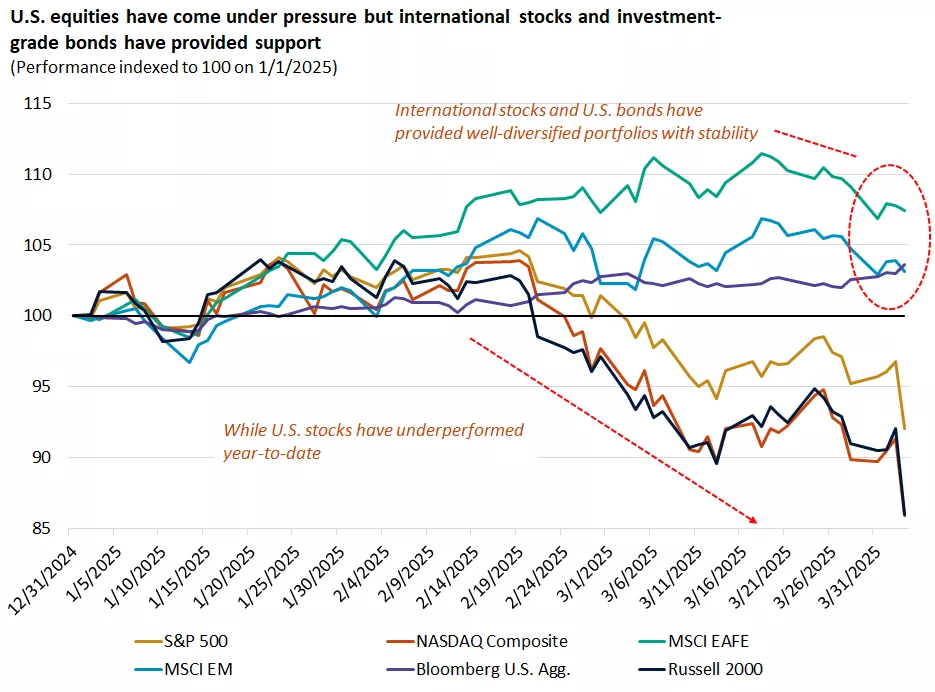Monthly international market focus
International stocks offer diversification in the face of tariff uncertainty
After a long stretch of underperformance, international equities achieved their best yearly start (relative to U.S. equities) in the past 35 years.* Diverging fiscal outlooks, a rotation to cheaper markets and a weaker dollar boosted returns. U.S. markets may retake the lead if sentiment around mega-cap tech stocks improves, but as Q1 showcased, international stocks play an important role in diversifying portfolios amid trade uncertainty.

This chart shows the relative performance of stock and bond indexes year to date, with performance indexed to 100 on 1/1/2025.

This chart shows the relative performance of stock and bond indexes year to date, with performance indexed to 100 on 1/1/2025.
Germany pivots to higher fiscal spending
Over the past two years, eurozone growth has stagnated, with Germany, which accounts for 30% of the region’s gross domestic product (GDP), particularly hurt by a manufacturing slump.
However, following elections in February, the German government approved a massive stimulus program to boost defense and infrastructure spending that is expected to inject €1 trillion of new spending over the next 10 years. This shifting attitude toward fiscal spending could improve the outlook for the country and the eurozone at a time when the U.S. is attempting to constrain government spending.
Investors rotate to cheaper markets
International equities have benefited from a rotation away from the U.S. mega-cap technology companies and into investments that have lagged in the past. The Magnificent 7 companies (Apple, Microsoft, Amazon, Alphabet, Meta, Nvidia and Tesla) have driven about half the gains of the S&P 500 over the past two years.*
But increasing competition around AI, elevated valuations and accelerating earnings growth from cyclical sectors have triggered a change in market leadership that is favoring international indexes. The growth sectors (information technology, communication services and consumer discretionary) account for nearly 50% of the MSCI USA index versus 23% for the rest of the world and, as a result, are less of a drag when they fall out of favor.*
Diversification is key amid trade uncertainty
Despite the improving outlook, the coast is not yet clear for international equities. An escalating trade war appears poised to weigh on global growth. Most other economies are more reliant on trade than the U.S. is. But U.S. growth will also be adversely impacted from tariffs, and its equity market continues to trade at significant premium.
Movements in the U.S. dollar will impact performance in the near term as well. Considering all of the moving pieces and trade headlines, we think portfolio diversification will be critical for investors to navigate this year’s twists and turns.
Action for investors
We recommend slightly overweighing U.S. stocks after the S&P 500’s 15% correction, staying neutral in emerging markets, and slightly underweighting international developed equities.
If exposure to international equities is too low, we recommend rebalancing to get closer to the portfolio’s strategic allocation. Within fixed income, we see an opportunity to overweight emerging-market debt, which has higher interest rate sensitivity and higher quality relative to U.S. high-yield bonds.
Angelo Kourkafas
Angelo Kourkafas is responsible for analyzing market conditions, assessing economic trends and developing portfolio strategies and recommendations that help investors work toward their long-term financial goals.
He is a contributor to Edward Jones Market Insights and has been featured in The Wall Street Journal, CNBC, FORTUNE magazine, Marketwatch, U.S. News & World Report, The Observer and the Financial Post.
Angelo graduated magna cum laude with a bachelor’s degree in business administration from Athens University of Economics and Business in Greece and received an MBA with concentrations in finance and investments from Minnesota State University.
Important information:
*Source: Bloomberg.
Past performance of the markets is not a guarantee of future results.
This content is for informational purposes only and should not be interpreted as specific investment advice. Investors should make investment decisions based on their unique investment objectives and financial situation. While the information is believed to be accurate, it is not guaranteed and is subject to change without notice.
Investing in equities involves risk. The value of your shares will fluctuate, and you may lose principal. Mid- and small-cap stocks tend to be more volatile than large-company stocks. Special risks are involved in international and emerging-market investing, including those related to currency fluctuations and foreign political and economic events.
Diversification does not ensure a profit or protect against loss in a declining market.
